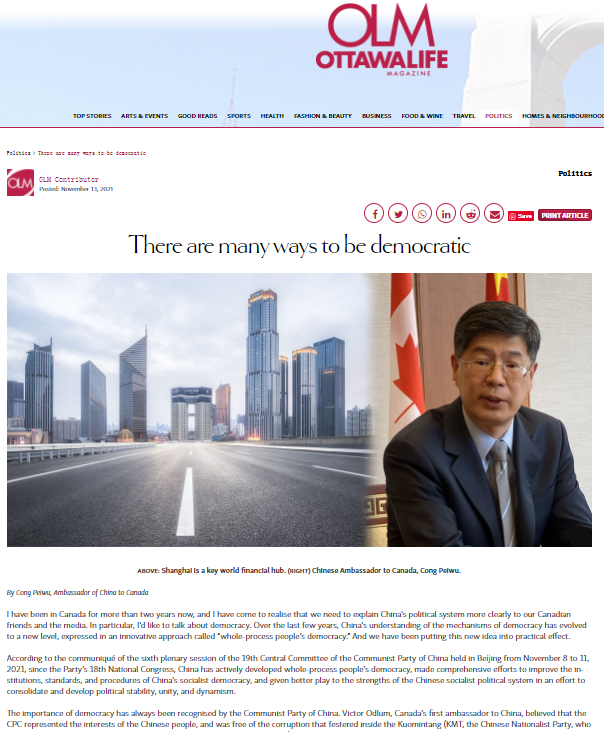Ambassador Cong Peiwu publishes a signed article on Ottawa Life Magazine
On November 13, Ottawa Life Magazine published a signed article by Ambassador Cong Peiwu titled "There are Many Ways to be Democratic". Here is the full text:

I have been in Canada for more than two years now, and I have come to realise that we need to explain China's political system more clearly to our Canadian friends and the media. In particular, I'd like to talk about democracy. Over the last few years, China's understanding of the mechanisms of democracy has evolved to a new level, expressed in an innovative approach called "whole-process people's democracy." And we have been putting this new idea into practical effect.
According to the communiqué of the sixth plenary session of the 19th Central Committee of the Communist Party of China held in Beijing from November 8 to 11, 2021, since the Party’s 18th National Congress, China has actively developed whole-process people’s democracy, made comprehensive efforts to improve the institutions, standards, and procedures of China’s socialist democracy, and given better play to the strengths of the Chinese socialist political system in an effort to consolidate and develop political stability, unity, and dynamism.
The importance of democracy has always been recognised by the Communist Party of China. Victor Odlum, Canada's first ambassador to China, believed that the CPC represented the interests of the Chinese people, and was free of the corruption that festered inside the Kuomintang(KMT, the Chinese Nationalist Party, who led the National Government of the Republic of China between 1925 and 1948). In a diplomatic letter written in 1943, Odlum described the ordinary people who made up the majority in the Communist-controlled areas as "masters of their own land." He believed that the Communist Party really was serving the interests of the people.
Whole-process people's democracy helps the nation to express the will of the people. An important product of this model is China's 14th Five Year Plan (FYP). I know that many businesspeople in Canada have been carefully analyzing this document, because it is crucial for China's socioeconomic development in the 2021-2025 period, and will create many opportunities for other countries, including Canada. During the development of the FYP, President Xi Jinping travelled extensively around the country. He chaired seven topical seminars, and listened carefully to suggestions from all stakeholders. The Standing Committee of the National People’s Congress(NPC) produced 22 reports on specific aspects of the economy. Government departments carried out open consultations that produced over a million contributions and suggestions from the public. These were distilled into more than 1,000 key recommendations, which were then incorporated into the drafting of the FYP. The draft FYP went through revision and amendment by deputies to the NPC and members of the People’s Political Consultative Conference, resulting in 55 changes. Finally, it was passed by a resolution of the fourth plenary of the 13th NPC.
This process was unprecedented in terms of its innovative form, the breadth of consultation, and the number of people who participated. It was a shining example of whole-process people's democracy.
Whole-process people's democracy is the crystallisation of evolving democratic practice of the People’s Republic of China. Democracy is not an ornament to be used for decoration. It represents the voice of the people, and is used to solve the problems that the people want to solve. The Wenling democratic consultation model is a vivid example of how democracy can resolve real-world issues for local residents, and has attracted praise from experts in the UK and USA.
Yukteshwar Kumar, deputy mayor of Bath in the UK, spent time in Wenling, a municipality in Zhejiang province on China's eastern seaboard. In many rural areas, he found local residents setting up benches and holding meetings in the village square to discuss the future of the village. The villagers argued, sometimes heatedly, and yet the meetings would end with "smiles and handshakes." "The level of popular participation determines the level of democracy and shapes the expression of democratic will," Kumar says. "In this sense, China's whole-process democracy has a richer and deeper meaning."
James Fishkin, Stanford professor and member of the American Academy of Arts and Sciences, also followed the Wenling democratic consultations, and commented that China's deliberative democracy was more effective than town hall meetings of some countries.
There are many ways to be democratic. No single model will fit every situation. In fact, it is hardly democratic to apply a single yardstick to all of the world's diverse political systems. Democracy is the right of all people in all countries, and it has always been a priority for China. The question of whether a country is democratic or not depends on whether its people are truly the masters of the country – and that is a question that should be judged by the people of that country.
Looking forward, whole-process people's democracy is set to unfold across China like brilliant flowers of spring and usher in a new democratic climate.